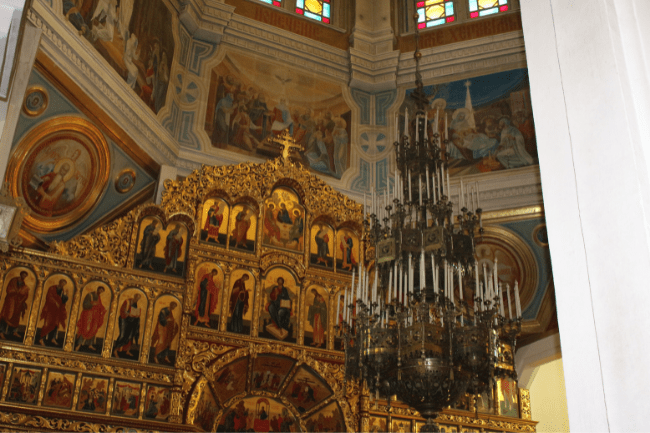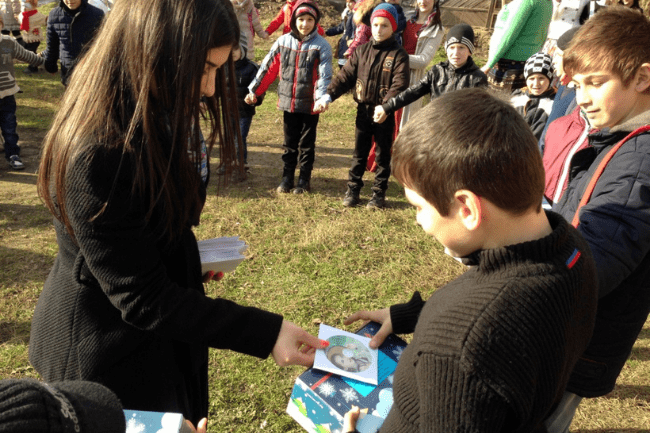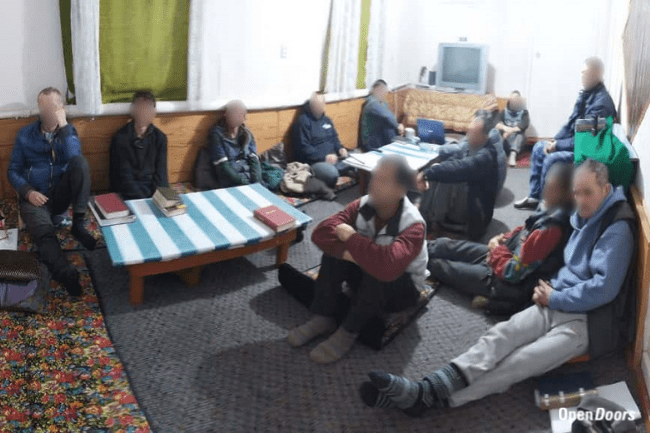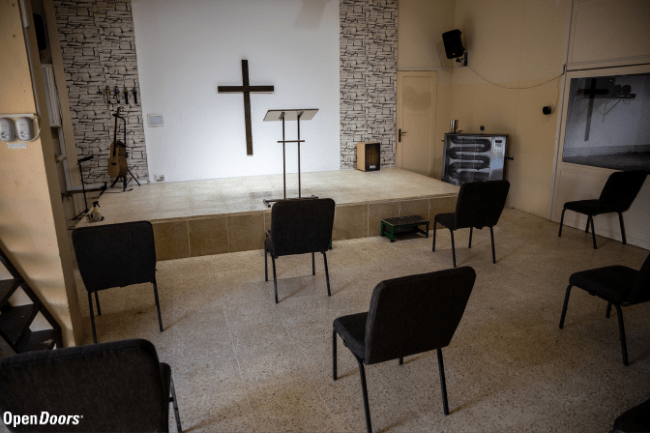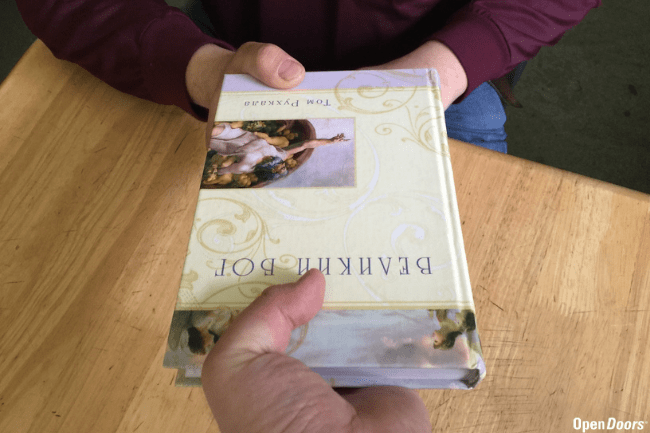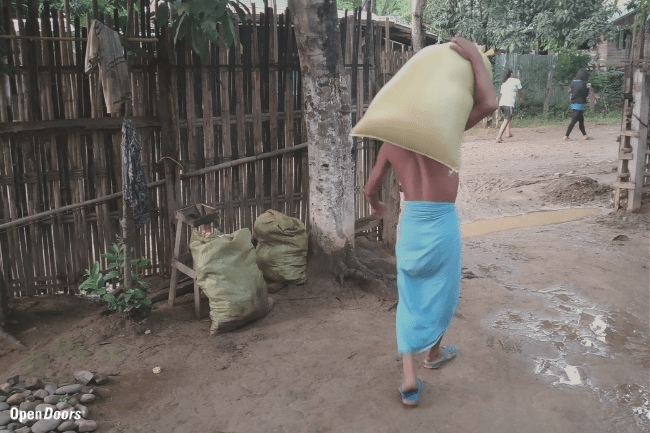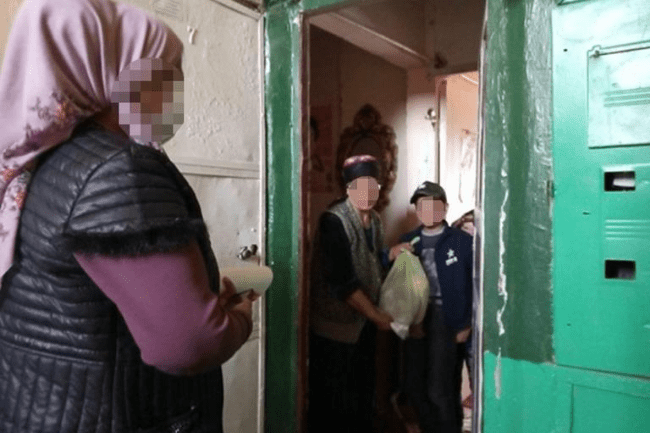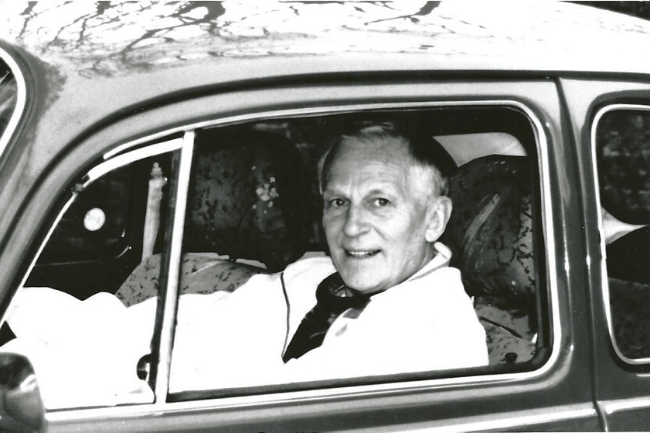How God built His church through prisoners and drug addicts
‘Something special had happened’
When Open Doors researcher Stefan* first visited Central Asia in the 80s, the church of local believers was tiny. But in the years since then, God has been powerfully at work – and not always among the people you might expect to come to faith in Jesus. Here he shares some of his experiences from the region.
I love to talk about the church in Central Asia. It’s a beautiful church.
My first trip there back in ’89. In those years Central Asia was still part of the former Soviet Union. You had about five Islamic republics in this area; Kazakhstan, Kyrgyzstan, Tajikistan, Turkmenistan, and Uzbekistan. But all these countries were being controlled by Moscow.
There were small communities of Christian believers in these countries. They mostly had either a Russian or a German background. Very few nationals, such as Uzbeks or Tajiks, actually had converted to Christ. In 1989 and the total number of Central Asian believers in those years was estimated at about 150.

We were going there trying to help the Russian and the German churches, and at the same time trying to help them in reaching out to the national population. This was really hard, because there was little interest in reaching out, and much focus on trying to preserve the church of their own.
Then I went back in 2014 for a secret underground conference with leaders from Central Asian countries. Almost all of them had a Central Asian background. I did not know exactly what to expect. And when I entered the room, I was just blown away by the fact that about 100-150 church leaders were there, all with a central Asian background. And it was such a clear sign that God had started to build a church in this remote part of the world. Something special had happened in the past few decades.
It’s a difficult situation for the church in central Asia. Russia is no longer in control, these are independent states – but in order to build a national identity, they are using Islam. And that means that when you are not a Muslim, you have problems, especially when you are active in evangelism. So it’s difficult for churches who are reaching out to Muslims, and it’s even more difficult for nationals who have converted to Jesus Christ.
‘I would like to know your secret’
It’s exciting how God is building his church in this area of the world. By now tens of thousands of nationals, of Uzbeks, of Tajiks, of Turkmen people, have come to faith. Each of them has their own unique story. But again, the Lord is reaching out in special ways and he’s often taking care of people who are at the fringes of society – people we do not think very highly of.
When I think of Central Asia, I think of a very active believer who used to be a criminal. ‘A really bad person’ – this is how he described himself. And for that reason, he ended up in jail. He spent many, many years in jail because he was a criminal.
But during his time in jail, he was visited by a lady who would bring him and the other prisoners food. She could not talk about her faith in Jesus Christ, it was not allowed, but she would simply enter the prison and give food.
He really loved her for doing that. So when he was released, he went looking for this lady and he found her. And he said, “I would like to know your secret. Why have you been visiting us in this prison for such a long time and giving this food?”
She said, “Because I love Jesus.” And he said, “I would like to know more about Jesus.” And she shared her faith and he came to faith as well. And since then he has been visiting prisoners trying to help them.
By now they have a whole community of people who have been in prison. It’s very special when you can join one of these meetings, because this is the way they greet one another: “Hi, my name is Vladimir Nine.” “My name is Ali Eight.” The figure they are giving is the number of years they spent in prison.
‘Complete peace’
The Lord is building a special community there – not just among prisoners. There are many people who had drug addictions, which is quite a challenge in a number of Central Asian areas. The region is close to Afghanistan, a major production house for hard drugs, and they are smuggled into the region. Many people fall victim to this. A number of Christians are trying to reach out to drug addicts.
This is a story about somebody I met not too long ago. He used to be an addict himself – first to drink, then to cigarettes, and then to hard drugs.
He was desperate. He tried to commit suicide twice. Miraculously, he survived and he wanted to start a new life, but he didn’t know what to do. And then he was talking to a friend of his and he said, “There is a special place here in town where they are taking care of drug addicts. The only bad thing is that the people who are running this house, they have this strange faith in Jesus. But if you just let that go in one ear and out the other, you’ll manage. They will really try to help you.”
He went to this place, and they took him in and they told him, “We are willing to take care of you on one condition: when you are here, no more drugs, no more smoking, normal drinks.”
He says, “I stopped with the drinks. I tried to stop with the drugs. But smoking… I was smoking all the time. I continued smoking in this house. And one day I was caught. I was called in for a meeting, and they told me: ‘You’ll be out the next time we see you smoking again.’
“Then I left them, I went into the room and I was desperate. I wanted to break free from all these addictions and to have a new life. But how to quit smoking? And I just cried out. I said, ‘Jesus, if you really exist, help me because I can’t do it alone.’
“That moment something happened. I felt something on my shoulders, very heavily. I did not know what to do. I went down to my knees and I stayed on my knees for a long time. I lost sense of time. I was just sitting on my knees and something touched me. From my head to my feet, something happened inside my body. And I got peace, complete peace. And I knew this is something of Jesus. But I didn’t know Jesus.
“I didn’t know what was happening to me. I didn’t have any explanation. I just had peace. So after this event, which took quite some time, I went back to the leadership of this house. And I said, ‘I would like to join your services.’ They prayed with me. And then the next morning I woke up and all of a sudden it dawned to me: ‘I’ve had no intention of smoking’.”
He was set free. He’s still free today. Today he’s an evangelist among his own countrymen. It’s just fantastic to see how he’s doing.
God is building a new church in Central Asia. There’s a lot of persecution, but there’s also hope for the church in Central Asia. Thanks to your prayers and support, Open Doors local partners are continuing to reach those who most need help and hope with the gospel in Central Asia. This includes partnering with local Christians to open homes for street children and recovering addicts, and supporting those ministering to prisoners and former prisoners. Open Doors partners also equip others to reach out with the good news, providing evangelism training for local believers.
The Impact of One Bible
Surrounding her grandmother is almost fifty other men, women, and children. Samira pointed out one young woman in the photo – her sister. Years ago, this sister had received a Bible of her own and had become a believer. Samira began to weep as she told us that her sister’s testimony had brought almost the entire family into a relationship with Christ – all because of one Bible.
The family’s Muslim background is normal in Central Asia. Converting to Christianity from Islam carries serious risks, including hostility from one’s own family. For people like Samira’s sister, the decision to share the gospel with family is not an easy one.
And yet the courage she showed continues to create ripple effects. Another Central Asian woman named Nailya* told us how she met Jesus. “As a little girl, I was searching for God. I started to pray the Muslim prayer ‘namas’ five times a day. This desire to know God, to know who He is, was in my heart from a very young age.”
Nailya’s marriage fell apart, partially due to her husband’s drug addiction. She was living with her parents, trying to care for her two sons, and she did not know where God was in her pain.

But she began to consider something unthinkable. Nailya had heard of a woman and her husband in the village who had become Christians. “In my heart I hated them for betraying Islam, the true religion. That’s why I actually didn’t want to go. But in my heart, I felt I should.” And so Nailya paid a visit to the Christian woman in the village: Samira.
Samira and her husband shared the gospel with Nailya and began to consistently pray for her. Nailya came back to their home for regular meetings. “As a young girl I had prayed ‘Please God, show me the truth’. During one service, God said to me ‘I am the Way, the Truth, and the Life’. In that moment I understood that God answered the prayer I had been praying from my childhood.”
Suhrob*, Nailya’s husband, had been living away from his family when Nailya began to pray for him too. “One day,” he told us, “I felt a strange desire to go to my wife’s parents’ house and take her back. So I went.” The husband and wife were re-united, and Suhrob began to join Nailya at the house church meetings. He soon left his drug habit and gave his life to Christ.
After his own conversion, Suhrob began sharing the Gospel with the customers at his barbershop, and this is where the persecution began. When word got out about the couple’s Christian beliefs, their landlords kicked them out and they were forced to move. A cycle began – Suhrob and Nailya found a new place to live, began witnessing to their neighbours, and were forced to move again. In time, Nailya and Suhrob were forced to leave to an entirely new area.

Nine years later, they had settled. They had a job, good schooling for their children, and were hosting a church out of their home. But they had never forgotten the situation back in the village where they grew up. They worried for their former neighbours and friends, the same people who had driven them away years before.
The family made the decision to move back. For several years, the six of them lived in a room of four by six metres, seeking a way to share the Gospel. One day, during this time, Nailya sat down to pray with Samira – the same woman who had shared Jesus with her all the years before. Nailya told of her desire to use her home as a place of blessing for others in the same way that Samira had done for her. The two women prayed together that God would accomplish this.
Today, Suhrob and Nailya live in a house with a garden in the village where they grew up. “The persecution we experienced was difficult,” Nailya admits. “There still is persecution, and pressure from the Islamic and secular authorities in the village.
But now, because of our way of life, many people changed their attitude towards us.” People are willing to come to their home and hear of how Jesus changed their lives. Nailya jokes that they call their house a spiritual rehab centre. “All people who come to our home receive prayer support and wisdom from God. If they haven’t heard the gospel, they hear about Jesus and find salvation.”
Back with the Open Doors team, Samira shut off her cell phone. She smiles as she thinks of the time her sister was given a Bible and made the decision to share her faith with the whole family. Through God’s grace and the prayers of the church, that decision has had beautiful results: all from just one person and just one Bible.
How you helped thousands of persecuted Christians
In the town where I live, all shops were closed except for one. The government had brought food to this store so that people without a job – people like me – could get food for free. I hadn’t been able to give my wife and children any food for the last two days. Finally help had arrived and we’d be okay for at least a week or two.
When I got near to the shop, I saw dozens of other people already in line. I waited patiently and silently. Nobody spoke to me. That was alright. I was used to it. In just a few hours I could bring home a bag full of supplies. Yes, my legs hurt, but that didn’t matter. I couldn’t stop thinking about the smiles on the faces of my wife and children.
Finally, it was my turn. I took out my ration card and gave it to the shop owner behind the counter.
“Why are you here?” he said, ignoring the card.
“What do you mean, Sir?” I replied. “I’m here to collect food. Look, I have government permission. I qualify.”
“No, you don’t. You are a Christian. Get out of here.”
“I am a Christian, but I have a ration card.”
“Get lost. Or I’ll call the police. Do you want to spend the night in jail too? Go!”
I slowly put the ration card back in my pocket and left the store, ignoring everyone who stared at me. I didn’t go home, but walked to the river instead. My mind was racing. I prayed. I thought about a thousand ways to get food and about a million ways to tell my family that I wasn’t sure if we’d ever eat again. I wondered if I should jump from the bridge.
A reality? Not for me and not for you, but for many brothers and sisters across Asia. The COVID-19 crisis and the ensuing lockdowns have led to harrowing situations. My teams and our local partners have received an incredible number of text messages and phone calls.
When the first desperate messages came in, I had a virtual meeting with all my leaders. I wanted to know just one thing from them: can we help?
“With God’s grace, we can,” they replied, and they went to work.
Fast forward six months. I’ve received our reports, and I’m informed that thanks to supporters like you, Open Doors has been able to help over 163,000 individuals receive emergency aid.

This is incredible. Over 163,000 persecuted Christians have received essential survival kits with food and sanitation items such as soap and face masks. My heart is filled with gratitude, because I know the stories behind the number.
I think of a community of ignored deaf Christians in Central Asia, who were forced to eat grass because nobody gave them anything. They received food and love.
I think of our local partners in Myanmar who risked their lives to visit cut off Christian families. They gave food and love.
I think of North Korean Christians who secretly were able to contact us in China. They collected food and love.
I thank God for opening doors and I thank God for you. You see, those 163,000 people were all at risk of severe malnutrition and even dying because of starvation. If hope is like a rope, they had come to the end of it. Thanks to you, we were able to give them a new rope, one that is stronger and longer than the one they had.
Thank you for getting us this far. You have been a source of inspiration. Your prayers and gifts mean that we know that God is with us in this difficult and often dangerous ministry.
The work is not done yet, however.
We all know that Covid-19 is still among us. We will continue to work to help the Persecuted Church in Asia survive. In Open Doors we have a saying: ‘Work as if everything depends on you and pray as if everything depends on God’. In other words: we work with the skills and understanding the Lord has given us, yet, we realize that outside of God we cannot do anything. We need Him to come through for us, so we pray.
Thank you for your prayers, thank you for support, thank you for your love for God’s children.
Thanks to you, the man from the beginning of this letter came home during the evening, to find bags filled with rice, cooking oil, vegetables, and much more. The smiles on the faces of his wife and children had never been so bright.
Providing food during a pandemic
He knew that was unrealistic. After all, providing food to that many people would require a lot of money. Still, he believed that God would provide the necessary funds and that the members of the church he pastored would be able to help distribute the aid.

In Central Asia, where Tammar pastored, churches are struggling to survive COVID-19. In countries where Christians can be persecuted because of their faith, believers face many challenges during lockdown. Many have lost their jobs, and often cannot count on support. When the government hands out aid, religious minorities might be last in line to receive it. Some people might be able to count on financial help from their family or friends, but many Christians have been rejected by their loved ones because of their faith.
Tammar knew that, and he wanted to help. His church set the goal of providing food to 100 families. Nor was he the only one – another church that Open Doors partners with said, “In connection with the introduction of a state of emergency and quarantine in our country, we revised plans for our children’s activities. We decided to provide grocery assistance to large and low-income families in order to establish contact with them.”
Food is not the only area of concern for persecuted Christians. In many countries, lockdown laws mean that believers can no longer gather and connect with each other. Some Christians are even forced to endure quarantine with the very people who abuse them. Zebede* is one such case: during lockdown, Zebede is forced to live under the care of her adult son, who beats her for reading the Bible and pressures her to renounce her faith. When Open Doors partners were able to bring her food, she burst into tears – not just because of the gift, but because she was able to see other Christians. Zebede continues to pray for her son every day.
It’s not just Christians who are in need, and the distribution of food actually gave Tammar and his church a reason to visit the homes of people they would not otherwise have been able to reach. Tammar asked us to pray for those who have received the gospel in addition to food aid: “In every home, people heard about God and how He took care of them. Let what is sown grow in the hearts of men and women.”
Pastor Tammar’s church was unsure if they would be able to help 100 families, but through God’s provision and the caring support of believers, the number was reached and exceeded. “We set the goal to help 100 families, but today we are talking about more than 2,000. This is a miracle for us. And it was made possible by those who gave us a part of their life, expressed in money.”
Thanks to the efforts of Tammar’s church and the believers in the area, over 2,000 families not only received necessary aid but also heard the good news of Jesus Christ.
This work was not without a cost, however. After helping deliver so much aid, Pastor Tammar tested positive for COVID-19, and in July the virus claimed his life.
The last days of Tammar’s life were spent serving people and showing them the love of God. He finished the race well, but leaves behind his wife Nadine (two years ago, Nadine lost their unborn child as a result of persecution and abuse).
Today, please pray for Nadine and other believers in Central Asia. Pray for a holy comfort to be given to Nadine, and for the seeds sown by Tammar’s work to bear beautiful fruit for the Kingdom of God.
If you would like to send a message of encouragement to Nadine, you can email us: encouragement@odcan.org. We’ll make sure all the messages get to her. Your support is a beautiful reminder of the family of believers coming together in times of hardship.
How the fall of the Berlin Wall changed everything
THE CHURCH UNDER COMMUNISM

The Berlin Wall began to appear on 13 August 1961. Open Doors’ founder, Brother Andrew, was one of the first to pass through Checkpoint Charlie. He has vivid memories of the impact of the Wall: “The flow of refugees from life under Communist rule was stopped overnight. There was no way out, no one could escape. The result was a wave of suicides, including some evangelical pastors. They lost hope.”
There was a clear ideological clash of values. One Communist thinker said, “The responsibility of the Communist is to be a militant atheist, an active fighter for the purity of Soviet ideology, for the complete eradication of religious prejudices.”
This was a regime based on rigid control. The church was isolated and under threat. Brother Andrew’s colleague, Johan Companjen, explains, “Back then, the Communists did not tolerate Christians at all. Christians felt totally forsaken. One pastor in Hungary said, ‘No one knows where I am, not even my family. Thank you for coming.’ Then he cried and cried. The police had closed his church and put him under house arrest.”
But, despite the threats, the arrests and the imprisonment, Brother Andrew’s abiding memory is that the church showed strength. He reports that one pastor said, “Boxing makes us strong.”
The origins of Open Doors come from Brother Andrew’s determination to play his part in strengthening this persecuted church. He made the first of many visits, taking Bibles through the checkpoints, praying that seeing eyes would be made blind.
Hundreds of thousands of Bibles were delivered. His conviction, then and now, was that Christians under this kind of pressure needed the encouragement of fellowship and the strength that could be found in God’s Word.
At the same time, he was moved to comment, “The persecuted church has so much more to teach us than we could ever teach them. To see the way they persevere under opposition, love God and forgive their tormentors is something we need to learn a lot more of in our society.”
PRAYER CHANGES THINGS
In 1982, Open Doors decided to prioritize work in the Soviet Union, focusing on two major projects: reaching out to the tens of millions of Russian Orthodox believers who did not have a Bible, and strengthening the church in the Muslim republics of the Soviet Union, giving them a vision to reach out to their Muslim neighbours. This was backed by a seven-year prayer campaign.
Slowly but surely, things began to change – and the impact was seen in the wider political world as well as within Open Doors. From 1987, large numbers of religious prisoners were released from labour camps and prison cells. There were 340 imprisoned Christian believers in 1985; just 17 by March 1990.
By 1988 the Soviet economy was in crisis. President Gorbachev, looking for support for a restructuring program, promised that from this point on Christians would be recognized as ‘Soviet people, working people, patriots’. Churches began to be reopened.
In the same year, changed postal regulations allowed tens of thousands of New Testaments to be sent to believers and churches across the Soviet Union.
Brother Andrew took advantage of the new openness to get an agreement that, during the millennium celebrations of the Russian Orthodox Church, Open Doors would officially present them with one million New Testaments: he handed over the one millionth copy in person in Moscow to the Patriarch Alexy II.
The Nikolai Church in Leipzig, East Germany, had been holding prayers for peace every Monday evening since 1982. From a handful, the numbers had grown, and the prayer meetings became a focus for people longing for change. In October 1989, around 70,000 gathered outside the church: it was the revolution of ‘candles and prayers’.
So, by November 1989, it was clear that change was sweeping through the Communist bloc. But the dismantling of the Berlin Wall, while the border guards looked on, was a dramatic sign that things would not be the same again. An Open Doors team member recalls that day: “My colleague and I got straight in the car and drove to Berlin to be part of that historic occasion. What a joy, what an answer to prayer!”
NEW HOPE – NEW RESTRICTIONS
Militant Islam has seen growth in areas where once Communism thrived. in many Central Asian states, after the fall of communism, Muslims from oil-rich nations used their wealth from this industry to reopen mosques and train new mullahs in Central Asia; Saudi Arabia donated one million Qurans to Soviet Central Asia. Despite heavy restrictions on religion, Islamic militancy is on the rise in all states of Central Asia; ISIS recruited some of their fighters from this region. In Tajikistan, Islamic groups are spreading due to poverty and the influence of Iran on Tajik society.
But the church has also been growing. In 1989 there were less than 1,000 Christians among the traditional Muslim populations of Central Asia; there were hardly any Turkmen, Uzbek or Tajik Christians. Since then, the indigenous church has come to life in Central Asia, and the Bible and Christian books have been translated into these languages.
In Azerbaijan, Chechnya, Kazakhstan, Kyrgyzstan, Tajikistan, Turkmenistan and Uzbekistan there are now dozens, hundreds or, in most of these countries, thousands of indigenous believers. Where there was perhaps no more than a Gospel in the national language, now there are New Testaments – even complete Bibles.
Central Asia has seen a remarkable and wonderful revival among Muslims. It is estimated that there are 320,000 believers from Muslim backgrounds in these states, out of a Protestant population of 322,700, and they are well integrated into many of the Protestant churches.
This revival really began in the 1990s, in the era of openness. After 1998 there was a significant exodus of foreign ministries and missionaries, as doors were slammed shut by various governments.
But thanks to your support and prayers, Open Doors continues to work in Central Asia, providing immediate aid to Central Asian believers when they are placed in prison, excluded from families and communities, and deprived of livelihood and employment because of their faith in Christ. We also strengthen the persecuted church in Central Asia through literature distribution, Biblical training, specific training for children, youth and women, advocacy and awareness training, vocational training, helping believers to start small businesses, presence ministry and prayer support.
‘WE NEED YOUR PRAYERS!’
Please continue to pray for our church family in the states of Central Asia that were once a part of the Soviet Union. Pastor Oleg* leads a church in Uzbekistan that is mainly made up of Muslim background believers. He says, “First of all I would like to say thank you for prayers! It sounds so encouraging that people from other countries are praying for us, I am so grateful for this! To feel God’s peace in our hearts in different circumstances, this is what I consider the most important for Christians. Please pray for this.
“Pray also that we would keep the passion for following Jesus and for our ministry. Pray for us to be able to resist the pressure with God’s power and not to make ‘steps back’ in our struggle but win over difficulties. Uzbek Muslim background believers need your prayers!”
*Name changed for security reasons

